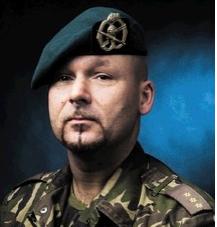
A living Medal of Honor recipient from the Long War.
Well, Dutch Medal of Honor - the first one in over 50 years.
Today, you will bear witness to an historic event taking place at the heart of our parliamentary democracy. Her Majesty Queen Beatrix will present a Dutch soldier with the highest award for bravery in our kingdom, the Military Order of William. Her Majesty will do so in the presence of His Royal Highness the Prince of Orange, Her Royal Highness Princess Máxima, the living Knights of the Military Order of William, and the military units which have been awarded the Order in the past.
Captain Marco Kroon will be the first person in 54 years to be appointed Knight of the Military Order of William. Her Majesty Queen Beatrix has granted Captain Kroon this award for his actions in Afghanistan in the period of March to August 2006. As commander of a 29-strong Commando Corps unit, he distinguished himself during numerous engagements by acts of bravery, skill and loyalty.
The Military Order of William is the oldest and the highest military honour in the Kingdom of the Netherlands. It was established by Act of Parliament no. 5 on 30 April 1815. This Act, consisting of 12 sections, remained in force until 30 April 1940, when it was reviewed ‘while retaining its proven sound foundations’. The first section now reads:“There is an Order, which serves to reward military personnel in the service of the Kingdom of the Netherlands who have distinguished themselves in battle by acts of exceptional bravery, skill and loyalty.”In exceptional cases, Dutch nationals who are not in military service and non-Dutch nationals, who
have distinguished themselves by such acts, may be admitted into the Order.
The Military Order of William comprises four classes:
- Knights of the First Class, or Grand Crosses,
- Knights of the Second Class, or Commanders,
- Knights of the Third Class,
- Knights of the Fourth Class.
A Knight of the Order who again distinguishes himself by an outstanding act of bravery, skill and loyalty may be considered for promotion within the Order. The first person to have the honour of being entered into the register of the Order was the Prince of Orange - later to become King William II - who led the Dutch troops at Quatre Bras and Waterloo in 1815.
More than 1,000 appointments were made as a result of these two battles. Many appointments were to follow during the course of the nineteenth century. For instance, the Belgian Revolution in 1830 and the Ten Days Campaign a year later produced a large number of new Knights. The Netherlands East Indies was the area where soldiers were most likely to be
awarded the Military Order of William, with the problematic region of Aceh topping the list. The countless military operations there in the period from 1873 to 1927 yielded two Grand Crosses, six Commanders, 42 Knights of the Third Class and more than 800 Knights of the Fourth Class. In the period before 1940, 5,874 people were awarded the Military Order
of William.
Since 1940, another 199 names have been added to the register of the Military Order of William, including two members of the Royal House, who were honoured for their inspiring leadership during the Second World War. Prince Bernhard was made a Commander on 15 June 1946 and Princess Wilhelmina, the first woman to be entered in the register of the Order, became a Knight of the First Class on 4 September 1948.
Prior to today, the last ceremony to award the Military Order of William was held on 12 July 1955. Captain J.H.C. Ulrici was decorated for his role in the resistance during the Second World War and his actions as a soldier in the Netherlands East Indies, and Captain T.E. Spier was decorated for his actions as a soldier in the Netherlands East Indies. The ceremony took place at the ‘Frederik Hendrik’ Barracks in Vught.
Those awards were presented by Prince Bernhard, who also officially knighted the two officers.
The Military Order of William was last awarded for operations in the Korean War. Of the 3,500 soldiers who served with the Netherlands Detachment of the United Nations in Korea, three were made Knights of the Order, two of them posthumously.
Don't discount what the Dutch have done in AFG. They have more than pulled their load - especially compared to their neighbors.
 ...and unlike our nation - they don't seem to have a problem honoring the living. Good for the Dutch - and hopefully and opportunity for some self-reflection on our part.
...and unlike our nation - they don't seem to have a problem honoring the living. Good for the Dutch - and hopefully and opportunity for some self-reflection on our part.
No comments:
Post a Comment